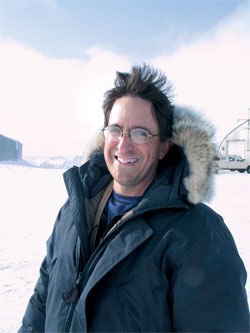BAM What were you doing on the North Pole?

Andrew Revkin For twenty years I’ve been writing about climate change, and as a journalist you go where the news is.
BAM What’s it like up there?
AR To land on ice on a 14,000-foot-deep ocean leaves kind of a hole in your gut. The ice we landed on is about six feet thick. It feels like you’re on the tundra or something; you have no sense of being on an ocean until the sounds begin. It’s just an unnerving experience to feel the vibration of the ice under your feet as this sort of raft of ice you’re floating on is colliding with another one.
It’s the one place I’ve been on earth where you really feel moment by moment that you’re standing on a planet. The sun goes in a circle in the sky, and there are no trees and no birds and no nothing except this white, crunching icy surface that’s speaking to you in a way that says “You’re not welcome here.” It’s a humbling experience.
And yet you have the flip side: We’re affecting this place, even without being able to be there. Long-term, through greenhouse gases, it appears increasingly likely that we’re going to make it into a place that is largely open water later in the century.
BAM What’s it like to write for kids?
AR I tried to make [the book] an adventure story about the science as well as about the history. I didn’t really think about writing for kids so much as I thought about writing as clearly as possible. Frankly, when I’m writing for the New York Times readership, I’m not really writing for that much different a level of understanding of science, because sadly most Americans really don’t know much about science anymore. One very telling statistic is that more people right now are concerned about the fate of the ozone hole in the atmosphere over the South Pole than they are about global warming, even though in the 1980s a treaty was passed, the Montreal Protocol, banishing the chemicals that caused the ozone hole to grow in the first place. It’s a problem that’s largely unrelated to climate change, but for some reason we have it stuck in our heads. I think there’s only room in our brains for one atmospheric problem at a time, and that one kind of got jammed there and people haven’t caught up with what’s really going on in the world.
BAM Is it hard to get stories about a long-term problem like global warming on the front page?
AR Yes. It only gets easy if it becomes some other kind of story, like a political story. We’re not used to thinking that we need to act now on the basis of a future risk.
BAM Still, you don’t seem to be trying to frighten readers. Why not? This is scary stuff.
AR People tend to recoil from scary things they don’t understand very well. I think people have been fed a fairly alarming picture, and that can make them feel paralyzed.
BAM You use the word intergenerational a lot when you talk about this book. What do you mean by that, and what are you hoping to accomplish?
AR Given what I’ve learned about this issue—that our actions today are shaping the climate of our children and grandchildren—it would be irresponsible of me to just write for grown-ups. It’s an issue that really weds the behavior of today’s grown-ups with the prospects of tomorrow’s children and grandchildren. I can’t feel content just writing for the people who are at the wheel of the car right now. I’ve got to write for the passengers too.




